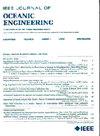Bearing-Only-Based Cooperative Target Enclosing Control for Multiple Uncrewed Surface Vehicles With Unknown Dynamics and Sideslip
IF 3.8
2区 工程技术
Q1 ENGINEERING, CIVIL
引用次数: 0
Abstract
Cooperative target enclosing control for uncrewed surface vehicles (USVs) is critical in tackling complicated maritime tasks in many scenarios. This article proposes a cooperative target enclosing control framework for multi-USV systems, focusing on unknown targets under the constraints of bearing-only measurements, sideslip effects, unknown dynamics, and external disturbances. A bearing-only-based cooperative target estimator is introduced to estimate the relative position and velocity of the unknown target in practical situations where only bearing measurements are available. Cooperative states among neighboring USVs are incorporated to relax the persistent excitation (PE) condition, enhancing the estimator's robustness. A cooperative controller based on USV kinematics is designed to achieve both distance keeping and evenly spaced circumnavigation with neighbors. To account for the sideslip effects caused by the unknown sway velocity of the USVs, extended state observers are employed to estimate and compensate for the unknown kinematic terms involving sway velocity, thereby improving the target enclosing control performance. In addition, a radial basis function neural network-based dynamic controller is developed to approximate and compensate for uncertain nonlinear functions in the dynamics, ensuring the stability of individual USVs in the presence of uncertain dynamics. To address the issue of complexity explosion in online adaptive networks, a minimal learning parameters technique is adopted to reduce the number of weights that need to be online adapted to two, thereby effectively alleviating the computational load. Comparative simulations are implemented to verify the effectiveness of the proposed target enclosing framework for multi-USV systems.未知动力和侧滑情况下多无人水面车辆的全方位协同目标封闭控制
无人水面航行器(usv)的协同目标封闭控制是解决复杂海上任务的关键。本文提出了一种多usv系统的合作目标封闭控制框架,重点研究了单方位测量约束下的未知目标、侧滑效应、未知动力学和外部干扰。为了在只有方位测量的实际情况下估计未知目标的相对位置和速度,提出了一种基于方位的协同目标估计器。引入了相邻usv之间的合作状态,放宽了持续激励条件,增强了估计器的鲁棒性。设计了一种基于USV运动学的协同控制器,既能保持距离,又能与邻居进行等间隔的环球航行。为了解决无人潜航器由未知摇摆速度引起的侧滑效应,采用扩展状态观测器对涉及摇摆速度的未知运动项进行估计和补偿,从而提高了目标封闭控制性能。此外,提出了一种基于径向基函数神经网络的动态控制器,对动力学中的不确定非线性函数进行逼近和补偿,保证了不确定动力学条件下单个无人潜航器的稳定性。针对在线自适应网络中复杂度爆炸的问题,采用最小学习参数技术,将需要在线适应的权值减少到2,从而有效地减轻了计算量。通过对比仿真验证了所提出的目标封闭框架在多usv系统中的有效性。
本文章由计算机程序翻译,如有差异,请以英文原文为准。
求助全文
约1分钟内获得全文
求助全文
来源期刊

IEEE Journal of Oceanic Engineering
工程技术-工程:大洋
CiteScore
9.60
自引率
12.20%
发文量
86
审稿时长
12 months
期刊介绍:
The IEEE Journal of Oceanic Engineering (ISSN 0364-9059) is the online-only quarterly publication of the IEEE Oceanic Engineering Society (IEEE OES). The scope of the Journal is the field of interest of the IEEE OES, which encompasses all aspects of science, engineering, and technology that address research, development, and operations pertaining to all bodies of water. This includes the creation of new capabilities and technologies from concept design through prototypes, testing, and operational systems to sense, explore, understand, develop, use, and responsibly manage natural resources.
 求助内容:
求助内容: 应助结果提醒方式:
应助结果提醒方式:


